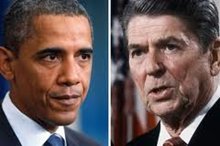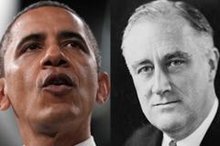Editor’s Note – It is very common for political mavens to make comparisons during a sitting President’s tenure, but often, its a snap shot of a very precise moment that is considered. These comparisons are often very short-sighted, they lack perspective, are self-serving to political slant, and are invariably shot down as history progresses. In Obama’s case, Christopher Ruddy does a fine job of elaborating on comparisons made between Obama and larger-than-life icons from the past; Ronald Reagan and FDR.
Ruddy compares Obama’s administration to a an often used SUA comparison, the ‘Keystone Kops’, and another of our favorites; the ‘Gang that cannot shoot straight’ also applies well. Please read on:
Obama Is Neither FDR nor Reagan
By Christopher Ruddy
In observing the workings of the Obama White House as it grapples with the worst American economy since the Great Depression, it’s difficult not to smile in amusement at the inept wheel-spinning of our executive branch, which bears a closer resemblance to a clueless team of Keystone Kops than to a savvy group of wise statesmen.
But to millions of jobless Americans, and all the rest who are suffering through these hard times, the poor performance of our feckless president is no laughing matter.
After 2 1/2 years in office, this administration is clearly not up to meeting the dire challenges that now confront the nation — challenges which are so ominous that they continually threaten to push the United States over the brink into a gigantic crisis.
Although at this point I cannot be surprised by new proof of the White House’s detachment from reality, I was nevertheless struck by a recent report in Time magazine describing an offsite meeting held in June by Obama’s senior staff during the debt-limit debate.
Seeking to blow away the foggy gloom that continues to bewilder, befuddle, and bedevil the administration, the wise men who advise the president decided to bring in Michael Beschloss, a well-known historian, to give the executive team a pep talk using feel-good historical comparisons between their mediocre boss and previous great presidents to aid in the task.
This “grasping at straws” exercise quickly descended from the sublime to the ridiculous when, according to the Time report, Beschloss told the assemblage that they shouldn’t lose hope in Obama’s chances of winning a second term because “two presidents in the last century, Franklin Delano Roosevelt in 1936 and Ronald Reagan in 1984, won re-election amid substantial economic sufferings.”
Now, I don’t claim to be a historian, but I happen to have lived through the Reagan administration and the second part of this assertion is simply not true.
 I remember very clearly that Reagan’s first two years in office were a brutally difficult time, through no fault of his own I might add. The nation was a stricken patient after the horrific Jimmy Carter “malaise” of the 1970s and tough economic medicine was not pleasant for the American people to swallow at that time, especially the bitter taste that came with high interest rates.
I remember very clearly that Reagan’s first two years in office were a brutally difficult time, through no fault of his own I might add. The nation was a stricken patient after the horrific Jimmy Carter “malaise” of the 1970s and tough economic medicine was not pleasant for the American people to swallow at that time, especially the bitter taste that came with high interest rates.
But by 1983 the economy had begun to turn around. Inflation, for instance, fell dramatically as Reagan (working in conjunction with Paul Volcker at the Federal Reserve) restored consumer confidence by the sheer force of his political courage in sticking with his highly effective recovery plan during its painful implementation.
The plan included an across-the-board tax cut of 25 percent, including for “rich” folk.
By August of that year (the point in Reagan’s first term that is comparable to where Obama stands today within his own first term), inflation had dropped under 3 percent — a tremendous decrease from the 12 percent rate that Reagan inherited when he was sworn in.
Right around the same time, the American economy took off, registering an impressive 9.3 percent growth rate in the third quarter of that year, with strong growth thereafter.
Given these facts, it is patently absurd to compare Obama’s first term to Reagan’s, which are starkly different.
Right now, we stand on the precipice of a new recession — the dreaded “double-dip” — while at this stage of Reagan’s first term the American economy was already bouncing back in resounding fashion, which we now know rocketed the nation into the stratosphere of unrivaled growth and prosperity in the decades that followed.
Lest we forget, Reagan’s 1984 re-election campaign was built around his famous television ad, “It’s Morning Again in America,” which was a well-deserved victory lap that the current president has obviously not earned.
Reagan won a stunning 49-state landslide that year —a result which Obama, even if he squeaks out a victory next year, will fall short of by a country mile.
I wasn’t around in the early 1930s, but it’s equally disingenuous to compare Obama’s first term to Franklin Roosevelt’s.
On close inspection, Obama and FDR bear little resemblance to each other, except perhaps in their reliance on government spending as the best way to inject life into a moribund economy. But even here there is an important difference to remember.
FDR was a great president for a whole host of reasons, but not because his New Deal policies were particularly sound. In truth, they proved largely ineffective in restoring the American economy during that tumultuous period. Massive mobilization during World War II put a stake through the malignant heart of the Great Depression, not massive government spending and “make work” programs.
The New Deal recovery plan was deeply flawed, but we can forgive the well-meaning FDR for his mistake because the Keynesian approach he advocated was new and untried economic theory at the time. We can’t cut Obama the same slack, however.
FDR enjoyed remarkable success during his first term that Obama has not approached in his. Under FDR, for instance, the unemployment rate fell from 24 percent in 1932 to 17 percent in 1936 — still a high level, but progress significant enough to generate public approval at the time and to ensure a landslide re-election that year.
FDR also created popular programs such as Social Security and the Works Progress Administration during his first term. These programs didn’t fix the Depression, but they made people feel good.
Obama’s landmark healthcare legislation, in contrast, was pushed through by a single vote in the U.S. Senate, and continues to be so unpalatable to the electorate that the president has thus far made no effort to run on what is supposed to be his greatest achievement.
If one desires to identify presidents who are similar to Obama, the first terms of Reagan and FDR are the wrong places to look.
Unlike Obama, these two men were charismatic leaders who were able to persuade the American people to follow them down a particular path toward economic recovery, and in doing so were able to convince Congress to go along with the plan.
Where is Obama’s leadership? Where is his plan for recovery?
The nation’s confidence in the first is non-existent and the fabric of the second has the tensile strength of wet newspaper.
His recent “jobs” program is nothing more than a $447 billion shell game that has the federal government spending money it doesn’t have over the next 15 months to get the president re-elected.
No, Obama hasn’t demonstrated he is anything like Reagan or FDR, two of the most beloved presidents in American history.
In truth, he is most similar to Jimmy Carter, Herbert Hoover, and, if we go far back into the 19th century, to the “Little Magician,” Martin Van Buren — all weak, one-term presidents who could not revive the American economy after it had fallen off a cliff into the deepest of holes.
Running on unsuccessful records, all of these presidents met crushing defeats when they sought re-election.
As of today, Obama is following very much in their footsteps. His current jobs program proposal is a short-term gimmick, just like the first $800 billion stimulus that has failed to cure the recession, as he promised it would.
How will the recession be cured?
Perhaps The Gipper put it best during the1980 presidential campaign when he prophetically observed with his characteristic humor that “recession is when your neighbor loses his job, a depression is when you lose yours, and recovery is when Jimmy Carter loses his” — timeless words that should apply to Barack Obama when the American public gives its job review in 2012.
Christopher Ruddy is CEO and editor of Newsmax Media Inc.

